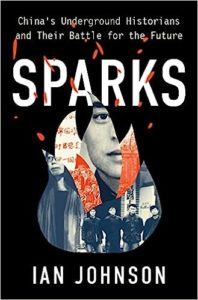 Book reviews of Sparks: China’s Underground Historians and their Battle for the Future by China veteran and Pulitzer prize winner Ian Johnson start to come in, rightfully, like this overview in Public Discourse by Robert Carle. “In Sparks, Ian Johnson tells the stories of people such as Lin Zhao and Hu Jie—Chinese journalists and filmmakers who explore the darkest episodes of Chinese communism, often at great risk to themselves.”
Book reviews of Sparks: China’s Underground Historians and their Battle for the Future by China veteran and Pulitzer prize winner Ian Johnson start to come in, rightfully, like this overview in Public Discourse by Robert Carle. “In Sparks, Ian Johnson tells the stories of people such as Lin Zhao and Hu Jie—Chinese journalists and filmmakers who explore the darkest episodes of Chinese communism, often at great risk to themselves.”
Public Discourse
A poet named Lin Zhao, who contributed to Spark, was the subject of Hu’s 2004 film Searching for Lin Zhao’s Soul. When Lin wasn’t handcuffed to chairs and beaten by guards, she wrote poems and essays on scraps of paper by piercing her finger with a hairpin and using her blood as ink. When she ran out of paper, she wrote on her clothing.
With her blood, Lin drew images on prison walls of an incense burner and flowers. From 9:30 to noon each Sunday, she held what she called grand church worship, singing hymns and saying prayers that she learned in her Methodist girls’ school. The prison guards put a tight-fitting hood on Lin that made it difficult for her to breathe and impossible for her to speak.
Lin was executed on April 29, 1968. On May 1, a Communist Party official visited Lin’s mother to demand that she pay a fee for the bullet used to kill her daughter.
Prison guards meticulously saved Lin’s writings to document her counter-revolutionary spirit. After Mao’s death, Lin’s files were declassified and sent to her family.
In Sparks, Ian Johnson tells the stories of people such as Lin Zhao and Hu Jie—Chinese journalists and filmmakers who explore the darkest episodes of Chinese communism, often at great risk to themselves. In Sparks, we meet Ai Xiaoming, who interviewed dozens of survivors of the Jiabiangou forced labor camp and their families to make her seven-hour documentary film, Jiabiangou Elegy (夹边沟祭事). We also meet Journalist Tan Hecheng, who uncovered the story of a 1967 Communist Party–led massacre of nine thousand innocent men, women, and children in Hunan Province. Tan devoted forty years of his life to researching the story of the systematic murders, finally publishing the book The Killing Wind in 2010. “Documenting this wasn’t quixotic,” Johnson writes. “It was a hard-nosed calculation that it would pay off—not for Tan personally but for his country.”
Ian Johnson is a speaker at the China Speakers Bureau. Do you need him at your meeting or conference? Do get in touch or fill in our speakers request form.
Are you looking for more political experts at the China Speakers Bureau? Do check out this list.
No comments:
Post a Comment